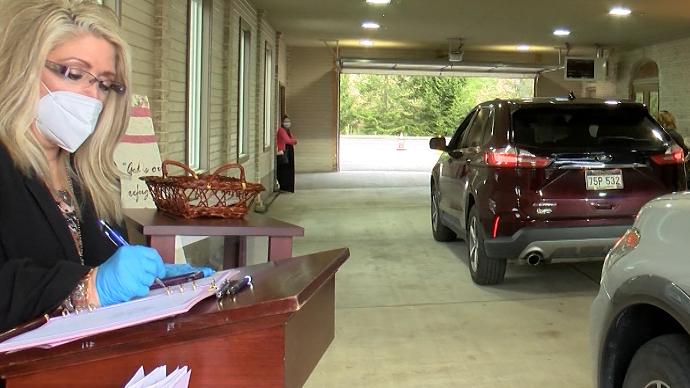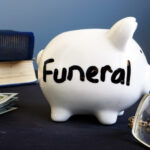
As the United States moves into its fourth month of quarantine mode, Americans have gotten accustomed to drive-thru medical checkups, and drive-thru grocery pickups, and even drive-thru garden supply and hair coloring kit pickups. But can the funeral be done drive-thru? Justin Nobel
In Buffalo, New York, last week the residential real estate matriarch Joni Stoyroff received a drive-thru funeral. Two weeks ago in Granite City, Illinois, local figure “Stormin’ Normin” received a drive-thru visitation. And the Los Angeles Times reported a story about a drive-thru funeral in Madera, California. Drive-thru funerals have popped up in New Jersey, Las Vegas, Boston, and Kentucky as well.
Last April, Inside Edition devoted a lengthy segment to the idea of a “drive-thru viewing in the age of social distancing.” The clip featured a funeral home near Memphis, Tennessee that took over the space of a bank, so the drive-thru apparatus was already set up. The facility has been operating for three years, but since the coronavirus pandemic began business has grown by 50 percent.
“It was a little impersonal,” one mourner reported to the regional newspaper, Morning Call, about a drive-thru viewing in Allentown, Pennsylvania. But the feature story the Chicago Sun-Times ran on drive-thru funerals in late April showed that they indeed can have some flair. “In a bad situation,” one mourner told the paper, “it’s the best thing.”
Perhaps nowhere is there more pizazz to the drive-thru funeral than New Orleans. “This is crazy,” Jay Banks, a New Orleans City Councilman says in a video posted recently by Nola.com. “We are saying goodbye to a Zulu king by driving by a house.”
Banks is referencing the well-known Mardi Gras krewe, Zulu Social Aid and Pleasure Club. In the video, residents with hand-made signs line the streets of New Orleans, almost reminiscent of a Mardi Gras parade, except most everyone is wearing masks and instead of colorful floats, the parade consists largely of somber-looking black-tinted SUVs. “This would have been one of the biggest funerals in the history of the organization had it not been for this pandemic,” says Banks. He adds, “Sixteen people directly in my orbit who weren’t dead a month ago are dead now from the coronavirus, so when people talk about it’s a hoax, it’s not real, it’s not that bad, I want to tell them that I got bodies to show that they’re wrong, they’re dead wrong.”
At the very least, drive-thru funerals create an opportunity for the critical process of mourning, and they create space for being able to appropriately move on. For example, in early April when Kentuckian John Renn Jr., a young hard-working father of four that worked the night shift at Lowe’s died in a car crash after falling asleep at the wheel, a traditional funeral was out of the question because of the coronavirus. But a drive-thru funeral provided at least some solace and normalcy.
“One by one, cars stopped in front of the Renn family’s front yard to look at a photo of the 31-year-old father, displayed on an easel at the end of the driveway,” the article reported. “They tossed flowers out of their car windows, released balloons, smiled, waved and wiped away tears, as family members waved back from their front yard.”
“Nothing’s gonna beat a hug, nothing’s gonna beat a kiss,” added an uncle, Rick Obst. “But this is all we’ve got. We’re trying to set an example, hopefully, of how we can do this the best way and still stay safe from the coronavirus.”
A drive-thru funeral or visitation provides at least some sort of thread to connect a deceased’s loved ones to the other family and friends that knew them in life. While a full reunion may not be possible just yet, even seeing a friend from a car window is a richer experience than chatting with them on a computer screen.
But there may be more to the drive-thru funeral than meets the eye. In a nation long obsessed with the automobile, striped with roadways, and famous for its roaring interstates and “blue highways” too, a drive-thru funeral makes some degree of sense. Think about it, says the Chicago Sun-Times writer Maureen O’Donnell, “America’s love affair with the automobile has produced drive-thru restaurants, dry-cleaners, coffee shops, prayer services, weddings.” And don’t forget the drive-in movie theater, which also appears to be making a comeback in the age of the coronavirus. With these car-centric traditions in mind, the drive-thru funeral actually seems like a deeply American tradition and one not so far-off from our norms.
It also happens to be a tradition that pre-dates the coronavirus.
An AP video posted back in 2014 from Saginaw, Michigan features Paradise Funeral president Ivan Phillips, an early adopter of the drive-thru funeral. “As you enter into the drive-thru you are going to see a memorial box where you can drop a memorial card or monetary contribution,” says Phillips, explaining just how the process works. Mourners drive on and push a button which opens a box that has a register book inside. Here people can sign their name and write messages of condolence to the family.
“Then you proceed forward,” says Phillips, “the curtains will drawback, and you may pay your respect to the loved one for three minutes from the privacy of your vehicle.” At this point, the driver has come up to a window that allows them to look in at a coffin lying behind glass.
The entire setup resembles a bank drive-thru, and the service was designed for mourners with physical limitations. “There is no question that the funeral business is one that is steeped in tradition,” wrote Digital Dying writer Molly Gorny, who penned a blog about Paradise back in 2014. “So it’s natural that when a service such as drive-thru funeral viewings comes along we’re tempted to poke fun at it.”
But Gorny points out that even in 2014 the concept was not entirely novel. She cites an early adopter of drive-thru funerals at the now-closed Junior Funeral Home in Pensacola, Florida. The facility started offering drive-thru services as early as 1986. Adam’s Funeral Home, located in Los Angeles’ Compton neighborhood, has also been offering drive-thru options for many years.
Gatling’s Chapels, the Chicago Sun-Times article points out, started offering drive-thru visitations via TV screen back in the late 1980s. Owner Lafayette Gatling, according to the article, “thought it would allow mourners with disabilities to get to wakes and also benefit people working in the building trades who didn’t have time to clean up before entering a funeral parlor.”
Now the coronavirus has offered new reasons for the drive-through, and it will be interesting to see if the practice catches on in a more pronounced way. As Joanna Ebenstein, artistic director and co-founder of Morbid Anatomy noted in our interview in April, citing the words of someone she had just recently interviewed, John Troyer, author of the new MIT Press book, Technologies of the Human Corpse: “Times like this are when these new technologies get pushed very quickly forward, and they would have probably taken a very long time to be accepted otherwise.”
With the car and the open road already so firmly etched into the American culture, and the American funeral already going through a time of significant change, and grieving becoming more remote for many Americans, could the drive-thru funeral be here to say? It just might be so.









